The Vulnerable Scientist
Only scientists who are honest and authentic or are working towards it will be on this podcast.Professor Brene Brown's research shows that vulnerability fosters good emotional and mental health. It is a sign of courage. We become more resilient and brave when we embrace who we truly are and what we are feeling. The Vulnerable Scientist Podcast is a space for scientists to tell their honest and authentic stories. I am your host Sarah Nyakeri who happens to be a scientist, Informal science communicator and I help scientists create personal websites. If you want to support this show, go to www.patreon.com/thevulnerablescientist.com You can also follow this podcast on all social media platforms @TVScientistPodTheVulnerableScientist.com See acast.com/privacy for privacy and opt-out information.
Episodes
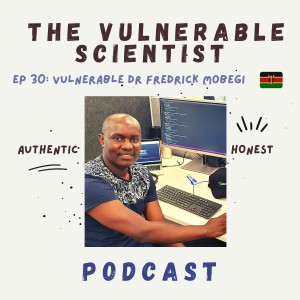
Thursday Jan 13, 2022
Thursday Jan 13, 2022
In this episode, I had a chat with an Australian based Bioinformatician, who has a unique Twitter username - mobeginomics , who shared his story about where he is at the moment.The Vulnerable Scientist is a Kenyan-based podcast that focuses on scientists' stories about their daily lives, work, and how they got to where they are. I am your host Sarah Nyakeri, a scientist, informal science communicator and a hiker. I am a multidisciplinary individual that does digital marketing and website design during my free time.The main questions asked that scientists are expected to answer vulnerable are: How are you, Introduce yourself, how did you become a scientist, What are the highs and lows you have experienced in your science career, tell the listeners about your hobbies, what question would you like to answer that has not been asked and how do you feel after having this conversation.Why did I start this podcast? You might ask. When doing my MSc project, my experiments started to fail at a certain period and it was very frustrating. I thought, If I finally get a new vaccine target for CBPP in cows, it would be all smiles but no one will ever know what I went through. I also wondered how many scientists were going through the same rough patch but did not openly talk about it?One day when I had just had a rough day, I talked into a mic about my day and I felt better. That was the first episode. At first, I thought it would just be journalling but after some fellow scientists heard it, they wanted to be Vulnerable too. Since then I have brought scientists from different fields to tell their stories of the highs and lows they have experienced with honesty and authenticity being the lead of our informal and long conversations.I enjoy asking questions since I am a naturally curious person. Feedback from the audience including scientists and non-scientists is the main motivation why I message scientists or accept their request to be on the podcast, schedule an interview, edit audio, design the artwork and post it and share it on social media platforms. It is a full-time job that requires me to spend from my pocket with no monetary returns so far but I enjoy it.If you want to be Vulnerable on the show, send me an audio message either on speak pipe (https://www.speakpipe.com/VulnerableScientistVoicemail ) or anchor (https://anchor.fm/thevulnerablescientist/message). Feel free to reach out too if you want to talk about a certain topic in the science career space or anything as a scientist that might have nothing to with science but affects scientists. The podcast is on social media @TVscientistPod and Website; TheVulnerablescientist.com. You can support the show (https://www.patreon.com/thevulnerablescientist) on Patreon or Paypal sarahnyanchera(at)gmail or Mpesa at (254)0718896962 under Sarah Nyakeri. See acast.com/privacy for privacy and opt-out information.
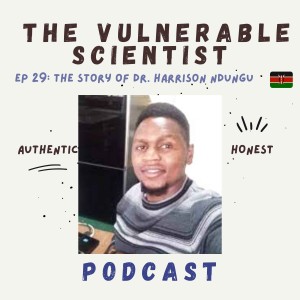
Wednesday Jan 12, 2022
Wednesday Jan 12, 2022
Dr. Harrison Ndungu is a Kenyan-based scientist who did his Phd in Germany but still looking for opportunities in Kenya. This shows the unappreciation of research in Kenya that causes limited opportunities in Science.This is repurposed interview from the science media Africa interviews done in collaboration with Planet wizard Africa Interview Questions:BackgroundPrescience Student experienceScience Interest: How it began and who has influenced your path into science.University experience: Bsc to PhDHow did you get your first job and subsequent jobsMentorship: Did you have a mentor, Is it important to others, Do you mentorWhat kind of opportunities are there in science or for science graduatesHighs and Lows in your careerMistakes and what you learnt from it, advise to younger selfTell us about your research….How you got into it, and how it helps the society: Past Present and Future if any.Future prospectsExperience as a woman in science: The changes over the years…Advantages and disadvantages of being a woman in science.Let’s talk about mental health: Any personal experience or things you would like to share about it.Advice to a young scientist.Anything you would like to add: Questions you wish I asked and wish to answer.The Vulnerable Scientist is a Kenyan-based podcast that focuses on scientists' stories about their daily lives, work, and how they got to where they are. I am your host Sarah Nyakeri, a scientist, informal science communicator and a hiker. I am a multidisciplinary individual that does digital marketing and website design during my free time.The main questions asked that scientists are expected to answer vulnerable are: How are you, Introduce yourself, how did you become a scientist, What are the highs and lows you have experienced in your science career, tell the listeners about your hobbies, what question would you like to answer that has not been asked and how do you feel after having this conversation.If you want to be Vulnerable on the show, send me an audio message either on speak pipe (https://www.speakpipe.com/VulnerableScientistVoicemail ) or anchor (https://anchor.fm/thevulnerablescientist/message). Feel free to reach out too if you want to talk about a certain topic in the science career space or anything as a scientist that might have nothing to with science but affects scientists. The podcast is on social media @TVscientistPod and Website; TheVulnerablescientist.com. You can support the show (https://www.patreon.com/thevulnerablescientist) on Patreon or Paypal sarahnyanchera(at)gmail or Mpesa at (254)0718896962 under Sarah Nyakeri. See acast.com/privacy for privacy and opt-out information.
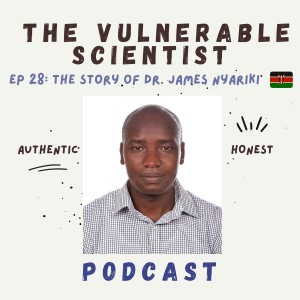
Tuesday Jan 11, 2022
Tuesday Jan 11, 2022
This is a repurposed interview from the science media Africa interviews done in collaboration with Planet wizard Africa Interview Questions:BackgroundPrescience Student experienceScience Interest: How it began and who has influenced your path into science.University experience: Bsc to PhDHow did you get your first job and subsequent jobsMentorship: Did you have a mentor, Is it important to others, Do you mentorWhat kind of opportunities are there in science or for science graduatesHighs and Lows in your careerMistakes and what you learnt from it, advise to younger selfTell us about your research….How you got into it, and how it helps the society: Past Present and Future if any.Future prospectsExperience as a woman in science: The changes over the years…Advantages and disadvantages of being a woman in science.Let’s talk about mental health: Any personal experience or things you would like to share about it.Advice to a young scientist.Anything you would like to add: Questions you wish I asked and wish to answer.The Vulnerable Scientist is a Kenyan-based podcast that focuses on scientists' stories about their daily lives, work, and how they got to where they are. I am your host Sarah Nyakeri, a scientist, informal science communicator and a hiker. I am a multidisciplinary individual that does digital marketing and website design during my free time.If you want to be Vulnerable on the show, send me an audio message either on speak pipe (https://www.speakpipe.com/VulnerableScientistVoicemail ) or anchor (https://anchor.fm/thevulnerablescientist/message). Feel free to reach out too if you want to talk about a certain topic in the science career space or anything as a scientist that might have nothing to with science but affects scientists. The podcast is on social media @TVscientistPod and Website; TheVulnerablescientist.com. You can support the show (https://www.patreon.com/thevulnerablescientist) on Patreon or Paypal sarahnyanchera(at)gmail or Mpesa at (254)0718896962 under Sarah Nyakeri. See acast.com/privacy for privacy and opt-out information.
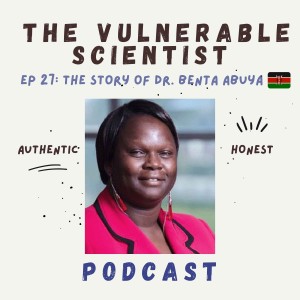
Monday Jan 10, 2022
Monday Jan 10, 2022
Dr Benta Abuya moves from being a high school teacher to educational research at APHRCThis is repurposed interview from the science media Africa interviews done in collaboration with Planet wizard Africa Interview Questions:BackgroundPrescience Student experienceScience Interest: How it began and who has influenced your path into science.University experience: Bsc to PhDHow did you get your first job and subsequent jobsMentorship: Did you have a mentor, Is it important to others, Do you mentorWhat kind of opportunities are there in science or for science graduatesHighs and Lows in your careerMistakes and what you learnt from it, advise to younger selfTell us about your research….How you got into it, and how it helps the society: Past Present and Future if any.Future prospectsExperience as a woman in science: The changes over the years…Advantages and disadvantages of being a woman in science.Let’s talk about mental health: Any personal experience or things you would like to share about it.Advice to a young scientist.Anything you would like to add: Questions you wish I asked and wish to answer.The Vulnerable Scientist is a Kenyan-based podcast that focuses on scientists' stories about their daily lives, work, and how they got to where they are. I am your host Sarah Nyakeri, a scientist, informal science communicator and a hiker. I am a multidisciplinary individual that does digital marketing and website design during my free time.The main questions asked that scientists are expected to answer vulnerable are: How are you, Introduce yourself, how did you become a scientist, What are the highs and lows you have experienced in your science career, tell the listeners about your hobbies, what question would you like to answer that has not been asked and how do you feel after having this conversation.Why did I start this podcast? You might ask. When doing my MSc project, my experiments started to fail at a certain period and it was very frustrating. I thought, If I finally get a new vaccine target for CBPP in cows, it would be all smiles but no one will ever know what I went through. I also wondered how many scientists were going through the same rough patch but did not openly talk about it?If you want to be Vulnerable on the show, send me an audio message either on speak pipe (https://www.speakpipe.com/VulnerableScientistVoicemail ) or anchor (https://anchor.fm/thevulnerablescientist/message). Feel free to reach out too if you want to talk about a certain topic in the science career space or anything as a scientist that might have nothing to with science but affects scientists. The podcast is on social media @TVscientistPod and Website; TheVulnerablescientist.com. You can support the show (https://www.patreon.com/thevulnerablescientist) on Patreon or Paypal sarahnyanchera(at)gmail or Mpesa at (254)0718896962 under Sarah Nyakeri. See acast.com/privacy for privacy and opt-out information.
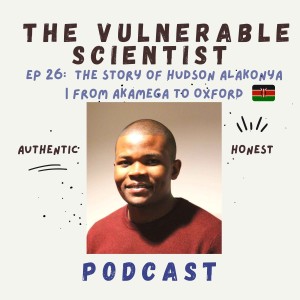
Friday Jan 07, 2022
Friday Jan 07, 2022
Hudson Alakonya is currently a PhD Rhodes scholar and the Founder and CEO of Integrated Cancer Research Foundation of KenyaThis is repurposed interview from the science media Africa interviews done in collaboration with Planet wizard Africa Interview Questions:BackgroundPrescience Student experienceScience Interest: How it began and who has influenced your path into science.University experience: Bsc to PhDHow did you get your first job and subsequent jobsMentorship: Did you have a mentor, Is it important to others, Do you mentorWhat kind of opportunities are there in science or for science graduatesHighs and Lows in your careerMistakes and what you learnt from it, advise to younger selfTell us about your research….How you got into it, and how it helps the society: Past Present and Future if any.Future prospectsExperience as a woman in science: The changes over the years…Advantages and disadvantages of being a woman in science.Let’s talk about mental health: Any personal experience or things you would like to share about it.Advice to a young scientist.Anything you would like to add: Questions you wish I asked and wish to answer.The Vulnerable Scientist is a Kenyan-based podcast that focuses on scientists' stories about their daily lives, work, and how they got to where they are. I am your host Sarah Nyakeri, a scientist, informal science communicator and a hiker. I am a multidisciplinary individual that does digital marketing and website design during my free time.The main questions asked that scientists are expected to answer vulnerable are: How are you, Introduce yourself, how did you become a scientist, What are the highs and lows you have experienced in your science career, tell the listeners about your hobbies, what question would you like to answer that has not been asked and how do you feel after having this conversation.If you want to be Vulnerable on the show, send me an audio message either on speak pipe (https://www.speakpipe.com/VulnerableScientistVoicemail ) or anchor (https://anchor.fm/thevulnerablescientist/message). Feel free to reach out too if you want to talk about a certain topic in the science career space or anything as a scientist that might have nothing to with science but affects scientists. The podcast is on social media @TVscientistPod and Website; TheVulnerablescientist.com. You can support the show (https://www.patreon.com/thevulnerablescientist) on Patreon or Paypal sarahnyanchera(at)gmail or Mpesa at (254)0718896962 under Sarah Nyakeri. See acast.com/privacy for privacy and opt-out information.
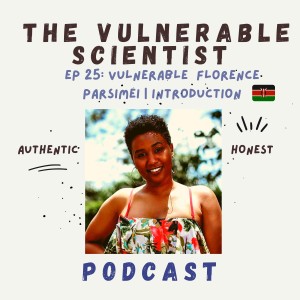
Thursday Jan 06, 2022
Thursday Jan 06, 2022
Everyone scientist either young or established ones have a story to tell and Parsimei is one of those people.The Vulnerable Scientist is a Kenyan-based podcast that focuses on scientists' stories about their daily lives, work, and how they got to where they are. I am your host Sarah Nyakeri, a scientist, informal science communicator and a hiker. I am a multidisciplinary individual that does digital marketing and website design during my free time.The main questions asked that scientists are expected to answer vulnerable are: How are you, Introduce yourself, how did you become a scientist, What are the highs and lows you have experienced in your science career, tell the listeners about your hobbies, what question would you like to answer that has not been asked and how do you feel after having this conversation.Why did I start this podcast? You might ask. When doing my MSc project, my experiments started to fail at a certain period and it was very frustrating. I thought, If I finally get a new vaccine target for CBPP in cows, it would be all smiles but no one will ever know what I went through. I also wondered how many scientists were going through the same rough patch but did not openly talk about it?One day when I had just had a rough day, I talked into a mic about my day and I felt better. That was the first episode. At first, I thought it would just be journalling but after some fellow scientists heard it, they wanted to be Vulnerable too. Since then I have brought scientists from different fields to tell their stories of the highs and lows they have experienced with honesty and authenticity being the lead of our informal and long conversations.I enjoy asking questions since I am a naturally curious person. Feedback from the audience, including scientists and non-scientists, is the main motivation I message scientists or accept their request to be on the podcast, schedule an interview, edit audio, design the artwork, post it, and share it on social media platforms. It is a full-time job that requires me to spend from my pocket with no monetary returns, but I enjoy it.If you want to be Vulnerable on the show, send me an audio message either on speak pipe (https://www.speakpipe.com/VulnerableScientistVoicemail ) or anchor (https://anchor.fm/thevulnerablescientist/message). Feel free to reach out too if you want to talk about a certain topic in the science career space or anything as a scientist that might have nothing to with science but affects scientists. The podcast is on social media @TVscientistPod and Website; TheVulnerablescientist.com. You can support the show (https://www.patreon.com/thevulnerablescientist) on Patreon or Paypal sarahnyanchera(at)gmail or Mpesa at (254)0718896962 under Sarah Nyakeri. See acast.com/privacy for privacy and opt-out information.
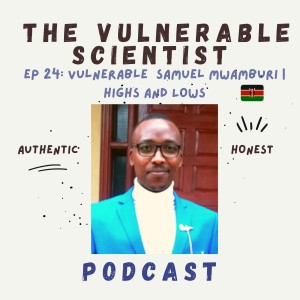
Wednesday Jan 05, 2022
Wednesday Jan 05, 2022
Samuel who recently moved from Kenya to Japan to pursue his PhD studies in Marine related work tells his story and how his passion for biology made him persevere through the challenges that come with pursuing a Science career in Kenya.The Vulnerable Scientist is a Kenyan-based podcast that focuses on scientists' stories about their daily lives, work, and how they got to where they are. I am your host Sarah Nyakeri, a scientist, informal science communicator and a hiker. I am a multidisciplinary individual that does digital marketing and website design during my free time.The main questions asked that scientists are expected to answer vulnerable are: How are you, Introduce yourself, how did you become a scientist, What are the highs and lows you have experienced in your science career, tell the listeners about your hobbies, what question would you like to answer that has not been asked and how do you feel after having this conversation.Why did I start this podcast? You might ask. When doing my MSc project, my experiments started to fail at a certain period and it was very frustrating. I thought, If I finally get a new vaccine target for CBPP in cows, it would be all smiles but no one will ever know what I went through. I also wondered how many scientists were going through the same rough patch but did not openly talk about it?One day when I had just had a rough day, I talked into a mic about my day and I felt better. That was the first episode. At first, I thought it would just be journalling but after some fellow scientists heard it, they wanted to be Vulnerable too. Since then I have brought scientists from different fields to tell their stories of the highs and lows they have experienced with honesty and authenticity being the lead of our informal and long conversations.I enjoy asking questions since I am a naturally curious person. Feedback from the audience, including scientists and non-scientists, is the main motivation I message scientists or accept their request to be on the podcast, schedule an interview, edit audio, design the artwork, post it, and share it on social media platforms. It is a full-time job that requires me to spend from my pocket with no monetary returns, but I enjoy it.If you want to be Vulnerable on the show, send me an audio message either on speak pipe (https://www.speakpipe.com/VulnerableScientistVoicemail ) or anchor (https://anchor.fm/thevulnerablescientist/message). Feel free to reach out too if you want to talk about a certain topic in the science career space or anything as a scientist that might have nothing to with science but affects scientists. The podcast is on social media @TVscientistPod and Website; TheVulnerablescientist.com. You can support the show (https://www.patreon.com/thevulnerablescientist) on Patreon or Paypal sarahnyanchera(at)gmail or Mpesa at (254)0718896962 under Sarah Nyakeri. See acast.com/privacy for privacy and opt-out information.
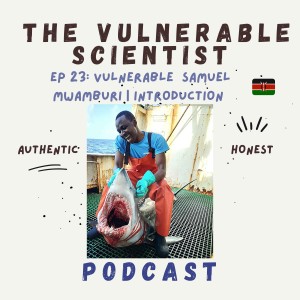
Tuesday Jan 04, 2022
Tuesday Jan 04, 2022
Samuel who recently moved from Kenya to Japan to pursue his PhD studies in Marine related work tells his story and how his passion for biology made him persevere through the challenges that come with pursuing a Science career in Kenya.The Vulnerable Scientist is a Kenyan-based podcast that focuses on scientists' stories about their daily lives, work, and how they got to where they are. I am your host Sarah Nyakeri, a scientist, informal science communicator and a hiker. I am a multidisciplinary individual that does digital marketing and website design during my free time.The main questions asked that scientists are expected to answer vulnerable are: How are you, Introduce yourself, how did you become a scientist, What are the highs and lows you have experienced in your science career, tell the listeners about your hobbies, what question would you like to answer that has not been asked and how do you feel after having this conversation.Why did I start this podcast? You might ask. When doing my MSc project, my experiments started to fail at a certain period and it was very frustrating. I thought, If I finally get a new vaccine target for CBPP in cows, it would be all smiles but no one will ever know what I went through. I also wondered how many scientists were going through the same rough patch but did not openly talk about it?One day when I had just had a rough day, I talked into a mic about my day and I felt better. That was the first episode. At first, I thought it would just be journalling but after some fellow scientists heard it, they wanted to be Vulnerable too. Since then I have brought scientists from different fields to tell their stories of the highs and lows they have experienced with honesty and authenticity being the lead of our informal and long conversations.I enjoy asking questions since I am a naturally curious person. Feedback from the audience, including scientists and non-scientists, is the main motivation I message scientists or accept their request to be on the podcast, schedule an interview, edit audio, design the artwork, post it, and share it on social media platforms. It is a full-time job that requires me to spend from my pocket with no monetary returns, but I enjoy it.If you want to be Vulnerable on the show, send me an audio message either on speak pipe (https://www.speakpipe.com/VulnerableScientistVoicemail ) or anchor (https://anchor.fm/thevulnerablescientist/message). Feel free to reach out too if you want to talk about a certain topic in the science career space or anything as a scientist that might have nothing to with science but affects scientists. The podcast is on social media @TVscientistPod and Website; TheVulnerablescientist.com. You can support the show (https://www.patreon.com/thevulnerablescientist) on Patreon or Paypal sarahnyanchera(at)gmail or Mpesa at (254)0718896962 under Sarah Nyakeri. See acast.com/privacy for privacy and opt-out information.
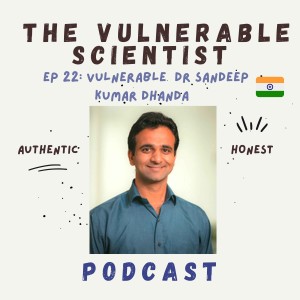
Monday Jan 03, 2022
Monday Jan 03, 2022
Sandeep Kumar Dhanda, PhD is a highly-skilled Bioinformatics Scientist who tells his career journey from a low-income background in India to a top institution in the US.To be trained on the use of bioinformatics in vaccine design, Register with Dollar education.The Vulnerable Scientist is a Kenyan-based podcast that focuses on scientists' stories about their daily lives, work, and how they got to where they are. I am your host Sarah Nyakeri, a scientist, informal science communicator and a hiker. I am a multidisciplinary individual that does digital marketing and website design during my free time.The main questions asked that scientists are expected to answer vulnerable are: How are you, Introduce yourself, how did you become a scientist, What are the highs and lows you have experienced in your science career, tell the listeners about your hobbies, what question would you like to answer that has not been asked and how do you feel after having this conversation.Why did I start this podcast? You might ask. When doing my MSc project, my experiments started to fail at a certain period and it was very frustrating. I thought, If I finally get a new vaccine target for CBPP in cows, it would be all smiles but no one will ever know what I went through. I also wondered how many scientists were going through the same rough patch but did not openly talk about it?One day when I had just had a rough day, I talked into a mic about my day and I felt better. That was the first episode. At first, I thought it would just be journalling but after some fellow scientists heard it, they wanted to be Vulnerable too. Since then I have brought scientists from different fields to tell their stories of the highs and lows they have experienced with honesty and authenticity being the lead of our informal and long conversations.I enjoy asking questions since I am a naturally curious person. Feedback from the audience, including scientists and non-scientists, is the main motivation I message scientists or accept their request to be on the podcast, schedule an interview, edit audio, design the artwork, post it, and share it on social media platforms. It is a full-time job that requires me to spend from my pocket with no monetary returns, but I enjoy it.If you want to be Vulnerable on the show, send me an audio message either on speak pipe (https://www.speakpipe.com/VulnerableScientistVoicemail ) or anchor (https://anchor.fm/thevulnerablescientist/message). Feel free to reach out too if you want to talk about a certain topic in the science career space or anything as a scientist that might have nothing to with science but affects scientists. The podcast is on social media @TVscientistPod and Website; TheVulnerablescientist.com. You can support the show (https://www.patreon.com/thevulnerablescientist) on Patreon or Paypal sarahnyanchera(at)gmail or Mpesa at (254)0718896962 under Sarah Nyakeri. See acast.com/privacy for privacy and opt-out information.
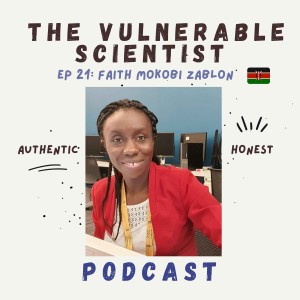
Friday Dec 31, 2021
Friday Dec 31, 2021
In this episode, Faith talks about her 9 years of looking for opportunities in science in Kenya while having a masters degree finally paying off. The Vulnerable Scientist is a Kenyan-based podcast that focuses on scientists' stories about their daily lives, work, and how they got to where they are. I am your host Sarah Nyakeri, a scientist, informal science communicator and a hiker. I am a multidisciplinary individual that does digital marketing and website design during my free time.The main questions asked that scientists are expected to answer vulnerable are: How are you, Introduce yourself, how did you become a scientist, What are the highs and lows you have experienced in your science career, tell the listeners about your hobbies, what question would you like to answer that has not been asked and how do you feel after having this conversation.Why did I start this podcast? You might ask. When doing my MSc project, my experiments started to fail at a certain period and it was very frustrating. I thought, If I finally get a new vaccine target for CBPP in cows, it would be all smiles but no one will ever know what I went through. I also wondered how many scientists were going through the same rough patch but did not openly talk about it?One day when I had just had a rough day, I talked into a mic about my day and I felt better. That was the first episode. At first, I thought it would just be journalling but after some fellow scientists heard it, they wanted to be Vulnerable too. Since then I have brought scientists from different fields to tell their stories of the highs and lows they have experienced with honesty and authenticity being the lead of our informal and long conversations.I enjoy asking questions since I am a naturally curious person. Feedback from the audience including scientists and non-scientists is the main motivation why I message scientists or accept their request to be on the podcast, schedule an interview, edit audio, design the artwork and post it and share it on social media platforms. It is a full-time job that requires me to spend from my pocket with no monetary returns, but I enjoy it.If you want to be Vulnerable on the show, send me an audio message either on speak pipe (https://www.speakpipe.com/VulnerableScientistVoicemail ) or anchor (https://anchor.fm/thevulnerablescientist/message). Feel free to reach out too if you want to talk about a certain topic in the science career space or anything as a scientist that might have nothing to with science but affects scientists. The podcast is on social media @TVscientistPod and Website; TheVulnerablescientist.com. You can support the show (https://www.patreon.com/thevulnerablescientist) on Patreon or Paypal sarahnyanchera(at)gmail or Mpesa at (254)0718896962 under Sarah Nyakeri. See acast.com/privacy for privacy and opt-out information.
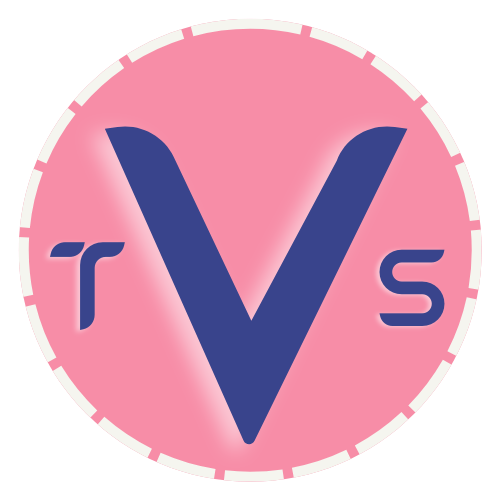
About
Only scientists who are honest and authentic or are working towards it will be on this podcast.
Professor Brene Brown’s research shows that vulnerability fosters good emotional and mental health. It is a sign of courage. We become more resilient and brave when we embrace who we truly are and what we are feeling. The Vulnerable Scientist Podcast is a space for scientists to tell their honest and authentic stories.
I am your host Sarah Nyakeri who happens to be a scientist, and Informal science communicator and I help scientists create personal websites.
If you want to support this show, go to www.patreon.com/thevulnerablescientist.com You can also follow this podcast on all social media platforms @TVScientistPod
